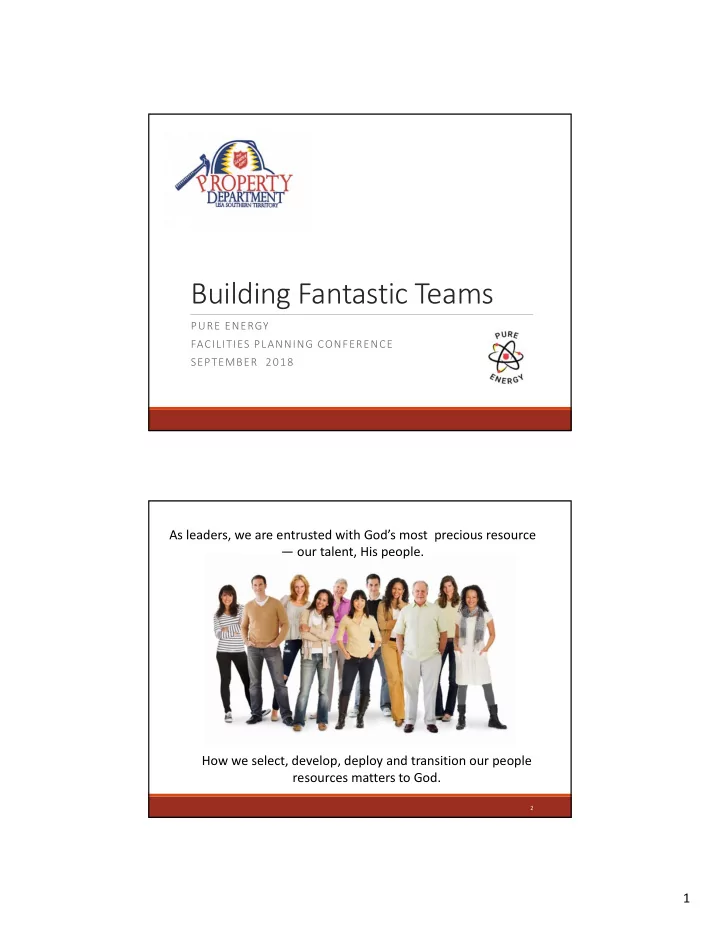

Building Fantastic Teams PURE ENERGY FACILITIES PLANNING CONFERENCE SEPTEMBER 2018 As leaders, we are entrusted with God’s most precious resource — our talent, His people. How we select, develop, deploy and transition our people resources matters to God. 2 1
Key Learning Outcomes Multiple perspectives increase long term success by removing personal bias. Character trumps skill every time . Teams needs common language and calibration . Emotional Intelligence and Learning Agility are the two strongest predictors for long term success. The best insights come outside of 1:1 interview. 3 2
Why we make poor hiring decisions? What does this mean? Bias has a biological base. It’s is natural and automatic. People are disposed to be biased against people who are unlike them and show more favor people towards who are like them; it's not all about being negative Most people will often not have insight to their own biases Unconscious bias affects our behavior in subtle and unintentional ways 3
What can you do to reduce bias? • Grow in self‐awareness. • Accept that YOU and everyone else have biases • Recognize and be vigilant in situations where your own biases are likely be most active. • Create and uphold robust hiring practices that engage multiple perspective. Hiring Process 4
As a Christ‐centered organization, employee selection is always a spiritual process. Hiring an employee is an operational process. Disciplined best practices ensure a reliable outcome that is efficient, effective, and compliant. 5
There are different types of workers. Volunteer Not Employee. Not Paid. Independent Contractor Not Employees. They determine the how, when and where. Vendor They determine overall cost of services. They pay their own taxes Temporary Employee Seasonal Employee Employees. Part‐Time Employee SA determines how, when, where of work. SA determines pay rate and hours. Full‐Time Employee SA pays taxes. 11 Best practice for a successful hiring process Preliminary Job Description Application Manger Interview Interview Team Interview Work References Debrief/Evaluation Background Check Consistency leads to strong Offer Onboarding culture and compliance 6
Six Steps to a Successful Interview Be Prepared: Review the candidates resume and application. Select specific questions to ask. Set expectations : Describe the time frame, what to expect and what happens afterwards. Explore : Ask at least one additional question to get a fuller understanding of his/her motivation, action and thought‐ process. S.H.A.R.E. Lead the Interview : You are in charge of the pace and flow of the interview. Ensure that you receive responses to all of your questions. Redirect when necessary. Avoid Legal Pitfalls Avoid: Are you a US citizen? or What country are you from? Alternative: Are you legally eligible to work in the United States. Avoid: Where did you live while you were growing up? Alternative: Your resume shows you worked in Canada. Tell me more about that experience. Avoid: Are you married? Do you have children at home? Who cares for them? Do you plan on having more? Alternative: Tell me about the most significant relationships in your life. 7
Avoid Legal Pitfalls Avoid: Have you ever been arrested, convicted, or spent time in jail prior to employment? Alternative: Note that we require a criminal background check to be completed and cleared at the time of hire. Avoid: Will you need personal time for particular religious holidays? Or Are you a Christian? Alternative: We are a Christian organization, but we cannot base our employment decision on a candidate’s faith. At the same time, we can expect our employees to be ambassadors of our values. Do you have any questions or concerns conducting your life in a way that is consistent with our value system? Select on the 4 Cs Character Competence Culture Chemistry 16 8
Character Ethical and Values Emotional Intelligence Ethics and Values • Makes judgements and decisions based on a moral compass. • Consistent patterns of behaviors that model humility, honesty and integrity. 9
We all have values. Does the candidate share yours? • Candidates responses should reflect the value system of the Salvation Army. • Honest • Respectful • Compassionate • Hardworking • Servant Attitude What attributes do you want your community and the world to see? Emotional Intelligence • Self‐awareness . Humble assessment of one’s strengths, weakness, emotional triggers and sin patterns. • Ownership . A demonstrated ability to own, learn and grow from mistakes. • Emotional Intelligence : The ability to be aware of, and control one's emotions. And, develop and maintain healthy relationships 10
What questions result in the best evidence? 11
Use the job description to identify areas of competence for focus. 6 months from now, how would you know if this employee was doing a good job? What would be happening in terms of impact to the tasks, team and community? Identify 3‐4 areas the candidate needs to demonstrate strength. Evaluation requires a common language 12
“Think on your feet” competency You are hiring for a new role and you need someone who can “think on their feet.” Write down what behaviors and skills will you be looking for in the next candidate. Think on your feet: Competency Example Definition: Key Behaviors 1. 2. 3. 4. 13
Learning Agility Definition The ability and willingness to learn from experience and subsequently apply that learning to perform successfully under new situations. Ability to wrest meaning from experience Highly Learning Agile Profile • Engage in self‐reflection; display self‐ awareness; seek feedback and try new behaviors • Are creative problem solvers who display curiosity and like to experiment. • They are open to change and challenge the status quo • Take risks; can tolerate ambiguity and complexity; and remain resilient through adversity 14
What questions result in the best evidence? 15
16
What questions result in the best evidence? 17
Customize the interview experience IKEA Interview Debrief before a Hire 18
Recommend
More recommend